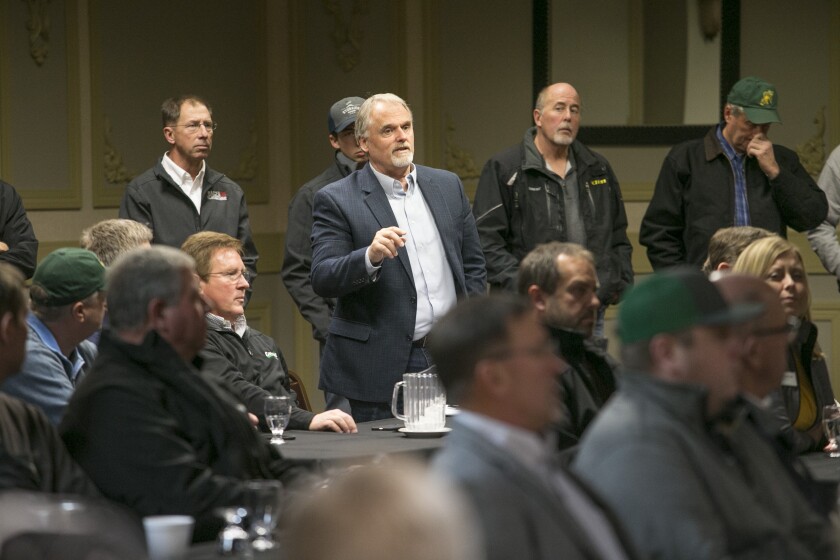CROOKSTON, Minn. — Sugar beet and potato farmers whose crops have been hard hit by excessive moisture this harvest converged on Crookston Tuesday, Nov. 5, to tell U.S. Rep. Collin Peterson about their unprecedented crop losses.
Peterson, a Democrat from Minnesota who chairs the U.S. House Ag Committee, called the meeting at the Crookston Inn to gather information that he can pass on to USDA Under Secretary Bill Northey, who oversees the Farm Service Agency. Northey will be in Moorhead on Friday, Nov. 8, to talk to farmers and congressional representatives from North Dakota and Minnesota about crop disasters and the potential for federal aid for farmers.
“I just wanted to get an update from you guys,” Peterson told about 75 farmers who attended the meeting.
Among the crops that have incurred severe damage are potatoes.
“The Red River Valley has been very hard hit this year,” said Donavon Johnson, Northern Plains Growers Association president. About half of the potatoes in the Minnesota and North Dakota growing area of the Red River Valley are still in the field, Johnson said.
ADVERTISEMENT
Aaron Hapka, Argyle, Minn., for example, has been unable to harvest nearly his entire crop — 300 acres of processing potatoes.
“My potatoes are frozen in the ground,” said Hapka, who farms with his father, Brian. “We’re all done. It’s a disaster.”
The sugar beet harvest also has been hampered by muddy conditions and freezing temperatures, but farmers are digging beets where they can, said Curt Knutson, a Fisher, Minn., farmer and American Crystal Sugar Co. board of directors chairman.
“We’re working on it every day,” Knutson said. “Some are going to come out of it better than others. We try to make sure everyone goes out and works as hard as they possibly can."
Federal disaster assistance for farmers whose crops have been damaged or destroyed may be a tough sell, Peterson told farmers.
U.S. Secretary of Agriculture Sonny Perdue has been inundated for requests for disaster assistance for farmers in other areas of the United States and may not be amenable for more, Peterson said.
Despite 20 years of work to remove ad hoc assistance from farm bills he’s helped draft, 40 percent of U.S. farmers’ income this year will be from the federal government, he said.
In 2018, Congress appropriated $3 billion for the Wildfires and Hurricanes Indemnity Program, called WHIP. Part of that money has been divvied out to farmers in the southern United States whose crops were damaged by wildfires and flooding.
ADVERTISEMENT
It remains to be seen how much of the $3 billion remains and how much will be used for North Dakota and western Minnesota farmers whose crops were damaged by excessive rains and snow, Peterson told farmers at the meeting.
“We’re going to be in a pot with everybody else,” he said.
For example, Peterson said, Perdue went to the state of Michigan, where a request for $100 million in disaster assistance was made. While there, Perdue was given a ride on a sugar beet harvester worth $700,000, Peterson said.
“He’s just sensitive about this, so I’m a little cautious about how we approach this,” Peterson said. ”He’s getting hit by all sides.”
Meanwhile, there’s not a lot of support for disaster assistance from the American public, he said.
“People don’t know anything about agriculture. They don’t know about farm bills. All they hear is farmers get a lot of money,” Peterson said.
ADVERTISEMENT









